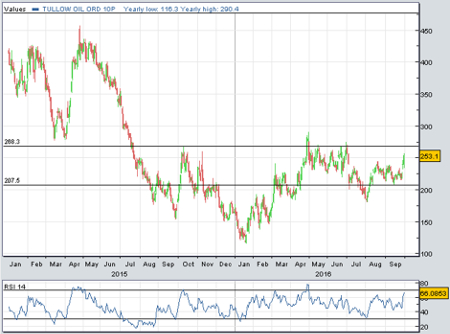Share of the week: Tullow does it again
30th September 2016 17:47
by Harriet Mann from interactive investor
Share on
This might have been the most exciting two days for oil markets this year. Although barrels of the black stuff still sell at a fraction of their 2014 highs, OPEC's decision to agree in principle to cut production for the first time in eight years is hugely significant.
Oil ministers meeting in Algiers this week will attempt to confirm cuts of 32.5-33 million barrels per day at their next get-together in Vienna in November. In the meantime, oil prices rallied, dragging energy stocks and US and UK equities up with them.
Brent crude climbed 7% to $49.24 a barrel following the Wednesday announcement, with Friday's expiration of futures contracts providing little incentive for prices to break $50 a barrel.
Still, the bulls have held firm, perhaps surprisingly given the crucial missing parts to the deal. We don't know who will shoulder the pain, or, indeed, whether it will happen at all.
"With Iran, Iraq, Nigeria and Libya in ramp up, what Saudi desperately wants to avoid is going back to being the swing producer," says broker finnCap. "Now that the quota system has been abandoned it wants to ensure that the others take some of the pain in order that all members benefit in the long term."
But all the excitement triggered a rush into bashed-up oil plays and, typically, was one of the biggest beneficiaries. It surged as much as 14% this week, making it our Share of the week for the second time. It appeared here seven months ago when the shares changed hands for 182p.
Up 3% to 257p Friday, Tullow has doubled since the 2016 lows, although it's still short of April's 290p high. and oil services groups , and also made this week's top 10 risers.

It's likely that the oil cartel's top dog Saudi Arabia has decided to take the hit on its balance sheet, admitting that attempts to squeeze big oil players out of production - mainly US shale - may have back-fired. Saudi's reserves have fallen by nearly a quarter to $564 billion (£434 billion) over the last two years, with $52 billion wiped off since January.
As oil production reacts quickly to lower prices, some of the excess inventory will fall away and shift the supply/demand balance toward equilibrium. Once that relationship is back in check, fund manager Alex Wright, who runs the , reckons oil will need to top $60 increase US production. This provides a lot of upside in terms of capital.
And with oil closer to $50, sector dividends look safer than before, says Wright.
" is now yielding over 7% and I think that dividend is secure if oil moves into the mid-50s and is very much payable from cash at that point over the next couple of years. That is quite an attractive shareholder return story."
This article is for information and discussion purposes only and does not form a recommendation to invest or otherwise. The value of an investment may fall. The investments referred to in this article may not be suitable for all investors, and if in doubt, an investor should seek advice from a qualified investment advise